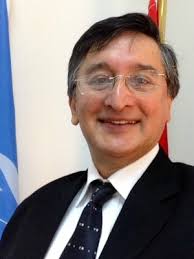By Byron Mutingwende
The government involvement and commitment to the United Nations systems coupled with the support of the development partners, civil society organisations, national associations, the media and community leaders and members will lead to the realisation of the Sustainable Development Goals (SDGs).
In his statement on the occasion of the 71st Anniversary of the United Nations at the World Health Organisation (WHO) office grounds on Monday 24 October 2016, Bishow Parajuli the UN Resident Coordinator to Zimbabwe paid tribute to the multi-sectoral engagement in making the attainment of SDGs a reality.
“Today, on our special day, we take stock of our year-long engagement in the development and humanitarian spheres in Zimbabwe. It is a culmination of a series of advocacy activities that has run throughout 2016: ranging from awareness raising around the core values and principles of the UN Charter, to building a national coalition for the implementation of the Agenda 2030 for sustainable development and its 17 goals,” Parajuli said.
In the same vein, during the course of 2016, a broad-based national coalition of SDGs was established. The Parliamentarians have taken the lead in legislating for SDGs friendly laws; and local government (provincial and district level) have committed to actively participate in the implementation of SDGs programmes on the ground.
Young people in schools, in universities and in their associations have been playing their role in SDGs advocacy online and off-line, whilst on the other hand traditional leaders have started mobilising communities into action.
The media has for long been on board setting the agenda of public discourse for a meaningful and objective dialogue on SDGs.
“This broad-based multi-stakeholder partnership on SDGs has been made possible under the overall leadership of the Office of the President and Cabinet with technical guidance from the Ministry of Economic planning and Investment Promotion,” Parajuli said.
The United Nations has been at the forefront in fostering partnerships that will continue to mobilise support, together with development partners and the rest of the international community.
He reiterated the need to increase the momentum on the commitment that “no one is left behind” in the quest to end poverty, hunger and protect the planet, as well as fulfilling the aspirations of SDG16 – ensuring peace, justice and strong institutions for all.
In pursuit of strengthening the institutions of democratic governance in line with the SDG16, Transparency International Zimbabwe (TIZ) signed a Memorandum of Understanding with the Parliament to promote constitutional and reform processes.
“TIZ would organise and co-ordinate mutually agreed activities that include capacity building, training and consultative meetings for the Parliamentary Committees and other staff of Parliament,” said Mary-Jane Ncube, the TIZ Executive Director.
She said there was also need to strengthen the capacity of Members of Parliament to enable them to mainstream issues of transparency and accountability and enhance their capacity to counter corruption through the tracking of and monitoring the use of public resources by all institutions of the state.
Still on the goal of leaving no one behind, TIZ has the Community Mobilisation and Advocacy (CMA) unit, which facilitates communities to drive initiatives to fight against corruption. CMA aims at providing tools and approaches or knowledge to ordinary citizens to stand up for a corruption-free Zimbabwe.
The unit also aims to ensure the maximum participation and involvement of citizens in the fight against corruption by organising communities and providing them the requisite support for impact.
TIZ also runs the Advocacy and Legal Advice Centre (ALAC) – a new anti-corruption initiative providing free legal aid services to victims and witnesses of corruption and seeks to empower male and female citizens to demand accountability and transparency. It is a community service centre that offers both pragmatic services to individuals, communities, companies and institutions who are victims of corruption or witnesses to corruption by giving legal aid and advice. The advocacy aspect of the centre focuses on public education and prevention strategies based on cases and complaints lodged and collated by the centre on a quarterly basis.
Speaking at the UN commemorative event, Kudzai Kwangwari, the Programme Manager of Zimbabwe Association of Community Radio Stations (ZACRAS) said the pursuance of SDGs can only be effective if the communities (including grassroots) are involved and have a buy-in to the 2030 Agenda.
“These people can only be involved if there are locally available platforms of communication like community radios. That’s communication for development. The SDGs can be simplified and communicated in local languages in a manner that makes sense to these communities. Community radio is in our view a tool to demystify development and make sense to the local communities,” Kwangwari said.
He added that brilliant development strategies and blueprints have not been successful because they did not get down to every household. In the same vein, TIZ has made use of community radio stations in Bulawayo and Mutare to reach out to remote communities.






